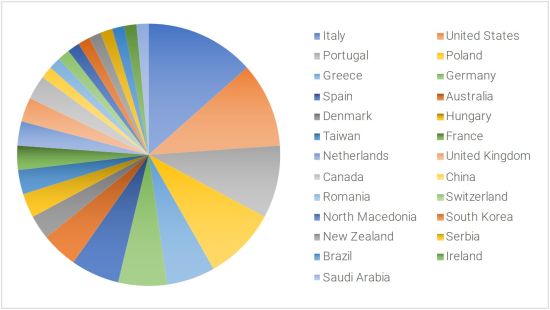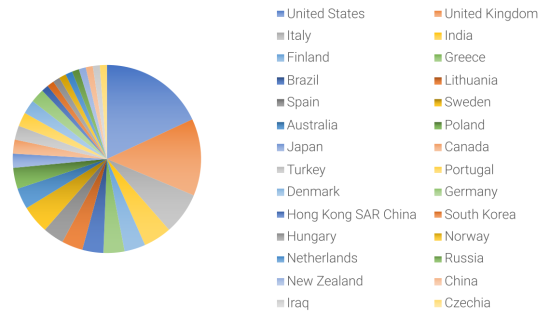Search Articles
Journal:
all
Keyword:
system level
Total
—
26 articles
Editorial 21 December 2023
Highlights of Sustainability Editorial Office
1276 Views396 Downloads
Article 20 December 2023
Mouna Samaali, El-Hassane Aglzim, Xavier Dessertenne and Patrick Dubreuille
This article is part of the Special Issue Feature Papers to the Inaugural Volume of Highlights of Vehicles.
Highlights of Vehicles
Volume 1 (2023), Issue 2, pp. 68–85
Volume 1 (2023), Issue 2, pp. 68–85
1446 Views552 Downloads
Article 2 November 2023
Constanze Trautwein
This article is part of the Special Issue Capturing the Sustainable Impact of Early-Stage Business Models.
Highlights of Sustainability
Volume 2 (2023), Issue 4, pp. 224–240
Volume 2 (2023), Issue 4, pp. 224–240
1761 Views585 Downloads
Article 22 September 2023
Carlo Berizzi, Margherita Capotorto, Gaia Nerea Terlicher and Luca Trabattoni
Highlights of Sustainability
Volume 2 (2023), Issue 4, pp. 185–206
Volume 2 (2023), Issue 4, pp. 185–206
2078 Views713 Downloads1 Citations
Article 21 July 2023
Nikolaos Partarakis, Effrosini Karouzaki, Stavroula Ntoa, Anastasia Ntagianta, Emmanouil Zidianakis and Constantine Stephanidis
Highlights of Sustainability
Volume 2 (2023), Issue 3, pp. 138–156
Volume 2 (2023), Issue 3, pp. 138–156
2129 Views608 Downloads
Article 17 June 2023
Wan-Ju Chen, Rong-Ho Lin and Chun-Ling Chuang
This article is part of the Special Issue Capturing the Sustainable Impact of Early-Stage Business Models.
Highlights of Sustainability
Volume 2 (2023), Issue 2, pp. 110–137
Volume 2 (2023), Issue 2, pp. 110–137
2364 Views606 Downloads1 Citations
Article 7 March 2023
Olaniran Anthony Thompson, Agbotiname Lucky Imoize and Taiwo Timothy Amos
Highlights of Sustainability
Volume 2 (2023), Issue 1, pp. 35–49
Volume 2 (2023), Issue 1, pp. 35–49
2074 Views692 Downloads2 Citations
Editorial 22 December 2022
Highlights of Sustainability Editorial Office
Highlights of Sustainability
Volume 1 (2022), Issue 4, pp. 253–254
Volume 1 (2022), Issue 4, pp. 253–254
1981 Views628 Downloads
Article 21 October 2022
Elena Bulmer, Magali Riera Roca and Julio Blas
Adopting a long-term perspective has helped companies survive in difficult times and overcome economic crises, recessions, and pandemics such as the current COVID-19. At present, the project management approach is changing from more authoritarian management models
Adopting a long-term perspective has helped companies survive in difficult times and overcome economic crises, recessions, and pandemics such as the current COVID-19. At present, the project management approach is changing from more authoritarian management models to frameworks that are based on the management of people and society. This article researches the concept of sustainable leadership in the project management profession. It evaluates the level of sustainable leadership among project managers in Spain using the Avery and Bergsteiner’s (2011) model of bees and locusts as a reference framework (Bee and Locust Sustainable Leadership Model). A qualitative study was carried out based on the analysis of the responses given by sixty-eight project managers in Spain who answered a 52-point ques-tionnaire. The findings yielded interesting results. It was found that in projects considered as temporal organizations, companies tended to employ a mixture of bee and locust’s leadership elements. Respondents recognized the importance of employee training and development, and most considered that it was essential to consider the environment when determining the organization’s commercial objectives. However, based on this study’s findings, the project management profession still has a long way to go as regards the practical implementation of sustainable leadership.
or
Access Full Article
Highlights of Sustainability
Volume 1 (2022), Issue 4, pp. 224–232
Volume 1 (2022), Issue 4, pp. 224–232
2891 Views1020 Downloads6 Citations
Article 26 August 2022
Stephen K. Wegren
Although Russia’s grain growing regions have experienced episodic droughts, the financial impact of climate change has to date been modest when measured in terms of value of production lost. As industrial agriculture continues to emit greenhouse
Although Russia’s grain growing regions have experienced episodic droughts, the financial impact of climate change has to date been modest when measured in terms of value of production lost. As industrial agriculture continues to emit greenhouse gases, the impact of climate change will intensify, making Russia’s southern regions drier and hotter, and potentially forcing a structural shift in production northward, an event that will lead to lower yields and grain output. The sustainable sector in Russia’s agricultural system is not able to compensate for lower grain output in the south, nor is it able to feed the nation or ensure food security across the full spectrum of commodities that consumers expect. The prospect of Russia as a declining grain power impacts the dozens of nations that import Russian grain, most notably authoritarian regimes in the Middle East.
or
Access Full Article
Highlights of Sustainability
Volume 1 (2022), Issue 3, pp. 188–201
Volume 1 (2022), Issue 3, pp. 188–201
3068 Views2042 Downloads2 Citations


Volume 2 (2023), Issue 4, pp. 303–304